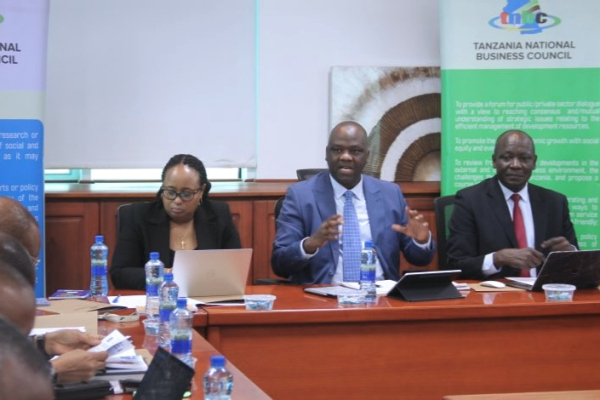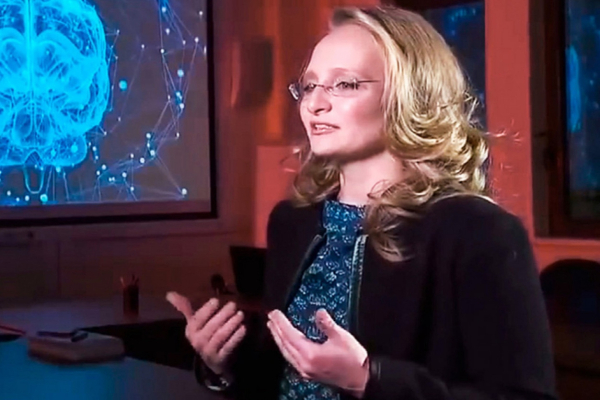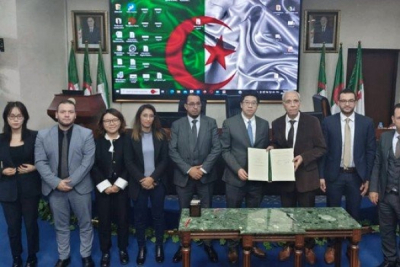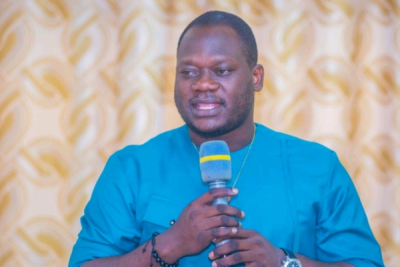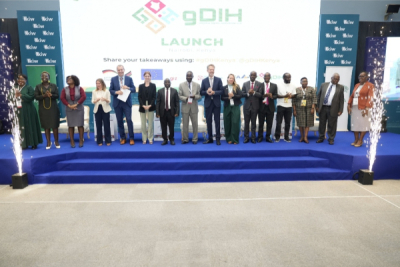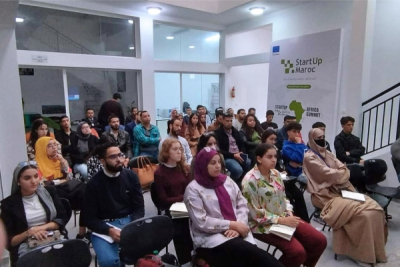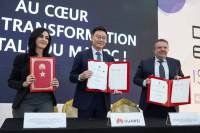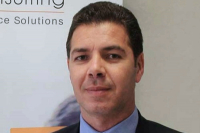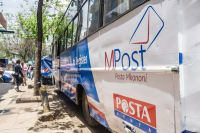Tanzania is currently finalizing its Digital Economy Strategic Framework 2023-2033, which is due for implementation in early 2024. A panel of digital experts has given the go-ahead to the suggestions and recommendations for the proposed national digital economy program.
According to local media reports, the program will serve as a roadmap for the country's day-to-day economic activities, guiding the processing and management of electronic messages and documents.
The African continent is undergoing a profound transformation of both its public services and its economy, driven by the rapid adoption of ICT. However, harnessing the full potential of these cutting-edge technologies requires the expertise and guidance of well-informed professionals.
Russia plans to enhance its ICT collaboration with African countries. As part of this effort, leading figures from some 36 African nations have been invited to Moscow this month to connect with Russian tech specialists and investors.
The initiative, spearheaded by Katerina Vladimirovna Tikhonova (pictured above), daughter of the Russian President, aims to support Africa's development of digital governance services, including cybersecurity, digitization of public services, and electronic voting. The initiative is being driven through a center affiliated with the Russian Foundation for Intellectual Development.
This effort falls under an awareness-raising project titled "e-Governance Knowledge Sharing Program," which was launched in July by the foundation in partnership with the Moscow Higher School of Economics.
Through this initiative, participating African countries will gain access to Russia's advanced expertise in providing digital services to citizens. According to international experts, Russia ranks among the most advanced countries in the digitization of public services. The country is ranked 42nd in this area out of 193 countries by the UN.
In terms of e-voting, Russia is currently testing a digital platform that will be used for the presidential election in 2024. This presents an opportunity for African countries to familiarize themselves with this innovation, which is still gaining traction on the continent. As a result of this working visit and the ensuing partnerships, African countries will also enhance their cybersecurity capabilities. Notably, in the wake of the conflict between Russia and Ukraine, the country has been actively developing solutions to strengthen its cyberspace.
Samira Njoya
To ensure the success of its digital transition program, Algeria needs a skilled workforce. For that purpose, the government wants to implement programs to match students’ skills to the demands of the job market.
The Algerian Ministry of Higher Education and Scientific Research has inked a partnership agreement with Huawei, a global leader in ICT equipment and infrastructure. The agreement, signed on November 28, 2023, aims to equip universities and colleges with cutting-edge technology while bolstering the digital skills of students and faculty. According to local media outlet Agence algérienne de presse, it was initialled by the Ministry's Secretary General, Abdelhakim Bentellis, and Huawei Algeria Vice President Alex Zhang Chang
Under the terms of the agreement, Huawei will provide six universities with state-of-the-art smart classrooms, enabling students to access world-class educational programs. Additionally, the company will collaborate with the Ministry to develop comprehensive training programs for teachers and students, focusing on in-demand digital skills such as artificial intelligence and cloud computing.
This strategic partnership aligns with the Ministry's vision of modernizing Algeria's higher education system and ensuring that students are equipped with the skills necessary to thrive in the digital era. The initiative builds upon the recent launch of 46 digital platforms designed to enhance the digital literacy of students and teachers, demonstrating the government's unwavering commitment to transforming the education sector.
Samira Njoya
Like virtually every socio-economic sector, agriculture, a cornerstone of development in Africa, is undergoing a digital revolution. In Togo, a young entrepreneur has designed a tech tool to digitize the value chain for more efficiency in the sector.
Edeh Dona Etchri (photo), a Togolese entrepreneur, is the founder of digital marketplace E-Agribusiness and the CEO of CLIN SARL, the company behind the marketplace. He graduated from CFI Médias (France) in 2017 with a diploma in digital and citizen project management.
Through E-AgriBusiness, he seamlessly connects various stakeholders within the agricultural industry, with the platform being accessible through a website, mobile application, USSD solution, SMS, chatbot, or call center, accommodating users in multiple local languages. As of now, the application is active in Togo, Côte d'Ivoire, Cameroon, and Congo-Brazzaville.
E-AgriBusiness serves as a lifeline for farmers, helping them minimize crop losses, enabling optimal pricing, fostering technological and financial inclusion, increasing income, and ultimately improving living conditions. The solution also enables buyers to streamline product targeting and purchasing processes, enhancing efficiency in the agricultural supply chain. It is also a valuable ally for governments and development partners, aiding in implementing agricultural policies, offering relevant indicators, promoting financial inclusion, and contributing to poverty reduction.
In an interview with CIO Mag in 2020 on the reasons that prompted the creation of E-Agribusiness, Edeh Dona Etchri explained that pre-harvest market linkages empower farmers to minimize post-harvest losses, eliminate the threat of spoilage, and enhance income stability, thereby promoting household well-being and uplifting socioeconomic status.
Apart from his role as CEO at CLIN SARL, the entrepreneur serves as the Technical Director of the IT company Wassa Group Sarl and holds the position of the national president of the Togolese association Numérique Citoyen, since 2021. His first company, EDZEPROCOM INFO, founded in 2011, introduced E-orga, a system for securing tickets, banknotes, and documents in Togo. He also founded MIABETOGO MARKET, an e-commerce platform promoting business visibility, WassaSMS, an SMS platform facilitating communication for companies, and the Doomevi platform designed to foster participatory democracy.
In 2016, E-AgriBusiness earned him the first prize for innovative applications in Togo, followed by another first prize at the 2017 AgriPME hackathon. In 2019, the Togolese head of state conferred upon him the title of chevalier national de l'ordre de mérite agricole, and in 2022, he received an honorary doctorate from the European-American University.
Melchior Koba
Kenya is making significant strides to solidify its position as the preeminent technology hub in East Africa. To achieve this ambitious goal, the country is forging strategic partnerships with key technical partners.
Kenya launched the Green and Digital Innovation Hub Kenya (gDIH) on Tuesday, November 28, during Kenya Innovation Week. The initiative, spearheaded by the Digital Transformation Centre of the German International Development Cooperation Agency (GIZ) in Kenya, aims to empower micro, small, and medium-sized enterprises (MSMEs) with the necessary technology and innovation resources to navigate the digital transformation journey and enhance their participation in the country's digital economy while adhering to green principles.
"As the digital economy evolves and competition becomes more intense, the hub stands as a distinctive platform for MSMEs to level the playing field, ensuring equitable access to digital innovation opportunities for all MSMEs in Kenya, irrespective of their geographical location," emphasized Bernd Lakemeier, GIZ Kenya’s Director of Programs Sustainable Economic Development Cluster.
The hub's activities will focus on fostering innovation in the agriculture, information and communication technology, and energy sectors, leveraging cutting-edge technologies such as artificial intelligence, the Internet of Things, cybersecurity/IT security, cloud computing, and smart cities. The promoters envision the gDIH becoming a major technology hub in the country, further strengthening Kenya's already robust technology landscape on a continental scale.
Commenting on the launch of gDIH, Prof. Tom Ogada, the Team Lead of the ACTS consortium said: “Embedding a green ethos into technological advancements holds substantial implications for Kenya’s sustainable development and economic growth. By fostering collaborations with diverse stakeholders and organizations, we are committed to extending the Hub’s influence beyond Nairobi to encompass all 47 counties, facilitating linkages to expertise, markets, and access to capital beyond the borders of our nation.”
Adoni Conrad Quenum
Leveraging its extensive experience, robust network, and forward-thinking vision, StartUp Maroc plays a pivotal role in fostering the growth of entrepreneurial and innovative ecosystems in Morocco and across Africa. The organization empowers aspiring entrepreneurs to transform their ideas into impactful ventures that generate positive social change.
StartUp Maroc is an organization that promotes entrepreneurship in Morocco and across Africa. Founded in 2011 by a group of young Moroccan entrepreneurs, including CEO Zineb Rharrasse, the organization is dedicated to nurturing high-potential entrepreneurs and startups poised to reshape the country, the continent, and the world.
Its comprehensive approach to entrepreneurial support encompasses a diverse range of activities designed to empower entrepreneurs and startups. The organization's flagship initiative, the Startup Africa Summit, serves as a platform for fostering collaboration, exchanging experiences, and exploring investment opportunities. This summit highlights the transformative power of innovation and the diaspora in shaping Africa's future.
Its suite of comprehensive programs to empower entrepreneurs includes the StartUp Maroc Booster program. This flagship initiative focuses on strengthening startups through three key pillars: financing, acceleration/mentoring, and international exposure. The program carefully identifies and accelerates high-potential Moroccan startups, providing them with the necessary capital and guidance to thrive.
With a focus on the Mediterranean region, its MEDVENTURES program aims to accelerate job creation and foster innovation. The program empowers entrepreneurs and ecosystem players to connect internationally, enhancing their skills and fostering collaboration. MEDVENTURES brings together entrepreneurs, investors, companies, NGOs, and public and private initiatives supporting innovation, research, and economic development clusters in Europe and the Mediterranean region.
StartUp Maroc has extended its operations across 17 cities in Morocco, offering support to over 15,000 entrepreneurs at various stages of their entrepreneurial journey, from initial ideation to commercialization. The organization's coaching and support initiatives encompass training courses, acceleration programs, one-on-one support, mentoring, conferences, and pitch events.
With a network consisting of over 400 experts and mentors, it has successfully organized more than 100 activities. It is supported by a number of partners, including The Next Society, Founder Institute, Startup Nations, the Euromed University of Fez, Technopack, the International University of Agadir, the Moroccan Exporters Association (ASMEX), and Orange Corners.
Melchior Koba
Nigeria has one of the most mature technology ecosystems in Africa. To further bolster the attractiveness of this ecosystem, the Nigerian government is forging strategic partnerships with key players in the industry.
On Wednesday, November 29, the African Development Bank (AfDB) announced the approval of an $80 million loan for the Ekiti Knowledge Zone (EKZ) incubation program. The funds will be used to build a 20-hectare green technology park and service infrastructure such as roads, electricity, water supply and wastewater treatment facilities. The Ekiti State Government will finance the project to the tune of $14.8 million, with a total project cost of $94.8 million.
"The Ekiti Knowledge Zone Project design responds to the requirements of technology firms and prospective investors as indicated during the preparation phase, lessons learned from similar Bank-financed projects such as the Cabo Verde and Senegal technology parks, and drew insights from good practices of similar initiatives in the continent and globally," said Lamin Barrow, AfDB’s Director General of Nigeria Country Department.
The EKZ incubation program aims to provide an enabling environment for research and development, information and communication technologies, incubation, and acceleration of technology startups, as well as pre-seed and seed financing. The goal is to transform EKZ into a major technology hub that could create some 26,000 jobs and generate net economic benefits worth $14 million a year.
In April 2023, the federal government granted EKZ "free zone" status, which will enable private investors to benefit from various advantages such as the free repatriation of capital, profits, and dividends by foreign investors; free land during the construction phase; tax exemptions; import and export duty waivers; and expatriate quotas for companies operating locally.
"This funding will play a crucial role in realizing our vision for EKZ [...] EKZ is not just about buildings; it’s about building communities, generating thousands of jobs, including opportunities for women and youth, while fuelling the State’s progress," said Akintunde Oyebode, Ekiti State Commissioner for Finance.
Adoni Conrad Quenum
Driven by an unwavering commitment to harnessing the transformative power of technology for the country's progress, the Moroccan government is actively fostering robust collaborations with key players in the technology sector. These strategic partnerships are expected to yield promising spin-offs in the years to come.
Morocco and Huawei recently announced a partnership to collaborate on a range of digital transformation projects. The partnership was formalized through the signing of three memorandums of understanding (MoUs) during the 2nd Digitech Ecosystem Summit held in Essaouira, Morocco.
They focus on the digitization of services, ICT training and skills development, and digital inclusion.
"The launch of the second edition of the 'Digitech Ecosystem Summit' forum, born of the convergence of the visions of all our partners, emphasizes the importance of strengthening digital skills and consolidating, in fine, the public-private partnership, considered to be a real lever for boosting the national digital economy," said David Li, Managing Director of Huawei Morocco.
The first agreement, a tripartite collaboration, involves Huawei, the Ministry in charge of Relations with Parliament and the Ministry of Digital Transition. It focuses on strengthening ICT skills, for the benefit of the Ministry's civil servants, its partners, and selected civil society associations.
The second agreement initiated between Huawei and the Essaouira Mogador Association for Essaouira Province aims to stimulate innovation, foster digital skills at the community level, and promote economic growth in the region.
The third partnership, signed with the Foundation for Research, Development, and Innovation in Science and Engineering (FRDISI), will train and certify students and teachers at the SUPTECH Santé school in Essaouira and Mohammedia in technological fields, to take advantage of Huawei's Digitech Talent program.
According to a Huawei press release, the signing of these agreements is in line with the tech giant's vision to be a catalyst for training, development, and digital innovation in Morocco. It comes at a time when Morocco is stepping up its digital projects to become a benchmark technology hub in Africa by 2025.
Samira Njoya
He believes data can revolutionize businesses and societies. So, with his team, he develops tailored data solutions helping companies make more sense of their data.
Walid Kaâbachi (photo) is a Tunisian computer scientist and technology entrepreneur, currently serving as the Managing Director of Biware, a consulting and integration company specializing in data management and analytics solutions.
He founded Biware, in 2011, with his partner Amine Boussarsar. The company focuses on providing tailored solutions for customer insight, risk management, fraud and compliance, demand forecasting, and model analysis to companies across various sectors, including finance, telecoms, retail, energy, and utilities. It has two flagship solutions. The first, Credit Squares, targets credit institutions, leveraging statistical methods, data analysis, and advanced artificial intelligence to enhance operational and commercial efficiency. This solution facilitates informed decision-making and effective customer lifecycle management.
The second solution is Synapse-HR, designed to help companies connect, engage, and develop their staff. Customizable based on each customer's specific needs, it provides detailed reports and dashboards for data visualization. Additionally, it can seamlessly integrate with various third-party analytical tools depending on the company's requirements.
Walid Kaâbachi's academic background includes a master's degree in theoretical and mathematical physics obtained in 1994 from the Nabeul Preparatory Engineering Institute. He also holds a diploma in computer engineering from the Tunisian School of Computer Science in 1998 and a master's degree in business administration from South Mediterranean University in 2019.
His professional journey commenced in 1998 at Informatique Développement et Etudes (IDEE), a software provider for the banking industry. From 2005 to 2009, he served as a business intelligence manager at Business & Decision SA, an international data and digital consulting and engineering group.
In 2012, Walid Kaâbachi and his partner Amine Boussarsar were featured in the special November edition of Entreprise Magazine, which recognizes the 100 managers who have significantly contributed to the business landscape in Tunisia.
Melchior Koba
MPost, a Kenyan startup that revolutionizes postal services by converting phone numbers into virtual addresses, announced on Wednesday, November 29, its decision to relocate its headquarters to Kigali, Rwanda. The company will establish its base within the coworking space of the Norrsken Foundation, a prominent investment fund operating across the African continent.
“Our relocation to Kigali, Rwanda marks a significant step in our journey towards a broader international footprint. We are enthusiastic about the opportunities this move brings, as it sets the stage for MPost to deliver innovative postal solutions to a wider audience,” the startup wrote on its LinkedIn page.
More...
Digital transformation offers a huge potential, notably for African countries. To capitalize on those opportunities, countries need to enhance connectivity. This is why like most African countries, South Africa is focused on developing broadband internet.
South African authorities introduced a Broadband Access Fund on Tuesday, November 28, specifically designed to support small and medium-sized businesses (SMBs) providing internet services in KwaZulu-Natal province. The fund aims to bridge the digital divide by providing partial subsidies to these SMBs, enabling them to connect 50,000 households and establish 3,000 community Wi-Fi access points.
The initiative has already benefited sixteen internet service providers, who will be tasked with extending broadband connectivity to underserved areas and reducing access costs. These efforts are expected to improve broadband penetration, increase employment opportunities, and stimulate economic growth in the region.
"Through the Broadband Access Fund, the government has reduced the cost of data considerably with packages from as little as R5 [~$0.26] per day Wi-Fi connectivity. We are enabling our people to have access to the Internet in an affordable, secure and safe way. We intend to connect more than a million households over the next six months,” commented Mondli Gungubele, South Africa's Minister of Communications.
The establishment of the Broadband Access Fund aligns with the President's job stimulus program, providing partial subsidies to internet service providers. This initiative forms part of the second phase of the SA Connect project, launched on Saturday, November 4, which aims to guarantee all South Africans access to affordable broadband connectivity.
Adoni Conrad Quenum
South African logistics startup GoMetro announced on Wednesday, November 29, the successful completion of an $11.4 million Series A funding round. According to Justin Coetzee (photo), GoMetro founder and CEO, the funding will be used to accelerate the company's growth and expansion plans, with a focus on developing its engineering teams, distribution, and partner management teams as well as enhancing the management of electric buses and trucks.
FSAT Labs provides a comprehensive suite of services, including incubation, open innovation, training, and startup acceleration, to nurture and empower entrepreneurs. Since its inception, it has fostered the continental and international success of numerous companies.
French South African Tech Labs (FSAT Labs) is a digital startup incubator and accelerator based in Century City, Cape Town, South Africa. Established in 2016 by Methys, a digital innovation and consulting firm, and the Small Enterprise Development Agency (Seda), it is committed to propelling early-stage digital startups across Africa.
Led by economic development and SME startup support expert Ndileka Zantsi, FSAT Labs provides a comprehensive ecosystem of support services for startups. The services include 400 square meters of dedicated space for startups to collaborate, innovate, and grow; equipping entrepreneurs with the digital skills and knowledge they need to succeed in the ever-evolving tech landscape; mentoring and coaching startups with personalized guidance and support throughout their journey; and tailored software development and research services to meet the specific needs of both enterprises and technology startups.
FSAT Labs offers two flagship programs to empower startups at every stage of their growth. Its six-month incubation program helps startups transform their ideas into businesses and get their first clients by providing workspace, mentoring, access to a network of experts and partners, and convertible loan financing. The program is divided into three phases. The first phase is the pre-incubation stage, a 4-week period during which the entrepreneur’s idea is validated. The second phase is the 6-month incubation period during which intensive support and guidance are provided. The last phase is the launch stage where startups are equipped to enter the market with confidence.
FSAT Labs also offers a 24-month acceleration program that propels startups to pre-seed or seed funding by offering comprehensive support, from mentoring to resources, throughout their growth journey.
Recognizing the importance of women's participation in the entrepreneurial world, FSAT Labs has established the Khwezi Lodestar Program, an initiative that aims to digitally develop 20 startups founded by women in each cohort. The program provides grants for software licenses and digital platforms, technical support, and mentoring led by accomplished businesswomen.
FSAT Labs has supported several startups, including Gamer's Territory, a technology hub to promote gaming in Africa; Lawyered Up, an African legaltech startup committed to accessibility, social impact, and gender equality within the legal industry; and HourlyRate, an AI-powered freelancing platform.
It is also supported by several organizations and institutions. These include Technology Innovation Agency (TIA), AfricArena, Old Mutual, French Tech Entrepreneurs Cape Town, Enrich in Africa, Silicone Cape Initiative and La French Tech.
Melchior Koba
Young Africans often dream of pursuing their higher education at international universities. But, they sometimes need more information, which makes them waste time and resources. In Madagascar, Tsanta Rakotoarimanga has developed a platform that connects students with mentors who provide guidance and support throughout their educational journey to address that issue.
Tsanta Rakotoarimanga (photo) is the founder and CEO of Mapwess, an online platform that helps students access quality higher education. He holds a bachelor's degree (2019) in finance from Université des Mascareignes in Mauritius and a master's degree in international strategy and management (2023) from Paris-Saclay University.
Driven by his own experiences navigating the complexities of studying abroad, Rakotoarimanga founded Mapwess in 2020 to empower African students to pursue their dreams of higher education at prestigious international universities. The platform connects students with experienced mentors who provide personalized guidance and support throughout their educational journey, from orientation and enrollment to settling into their new environment. With the platform, Rakotoarimanga aims to help 10,000 students realize their dream of studying abroad.
"The idea for Mapwess stemmed from our own challenges in preparing for our studies abroad," Rakotoarimanga explained. "We realized that many students face similar struggles, and we wanted to create a solution that would make the process more accessible and less daunting."
Prior to launching Mapwess, Rakotoarimanga established Dream Studio Agency, a student placement agency that successfully helped numerous young Africans secure placements at renowned institutions. He attributes his entrepreneurial success to the support he received from startup incubators like Orange Fab Madagascar and Zafy Tody, which provided him with valuable resources and mentorship in a context where entrepreneurship was not an easy task in Madagascar and financial institutions and private investors were not confident enough to back him.
Rakotoarimanga's dedication to empowering African students has earned him recognition and accolades, including the third prize in the national stage of the Orange Social Venture Prize in Africa and the Middle East (POESAM) in 2020. In 2021, he was selected as one of Africa's best young entrepreneurs for the Anzisha Prize. This year, he got the opportunity to represent Madagascar in the YALI (Young African Leaders Initiative) program for the Southern African region.
Melchior Koba


